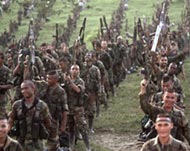Colombian fighters surrender arms
The head of Colombia’s right-wing paramilitary armies has asked for forgiveness from victims in his country’s civil war, during a ceremony to demobilise nearly 1500 fighters.

Salvatore Mancuso, considered Colombia’s most powerful paramilitary commander as the leader of the 20,000-strong United Self-Defence Forces of Colombia, known by its Spanish initials AUC, wept as he apologised to mothers of victims and also to the US.
“With my soul flooded in humility, I ask the pardon of the people of Colombia, the pardon of the nations of the world, among them the United States of America, if by my action or inaction I have offended them,” Mancuso, with a catch in his voice, told those attending the ceremony in a jungle village in the cocaine-producing Catatumbo region.
“I beg the pardon of every mother and of those whom we have caused pain. I assume my responsibility as leader, for what I could have done better, for what I could have done and did not do, errors surely caused by my human limitations and my lack of vocation for warfare,” he said.
Wanted man
Mancuso is wanted in Colombia for the massacre of 15 peasants in the late 1990s and in the US on drug-trafficking and money-laundering charges.
|
“I beg the pardon of every mother and of those whom we have caused pain. I assume my responsibility as leader, for … errors surely caused by my human limitations and my lack of vocation for warfare” Salvatore Mancuso, |
His militia was set up by cattle ranchers and cocaine traffickers to fight Marxist rebels and the group has often worked with sectors of the armed forces against their common foe.
The paramilitaries deny they are drug traffickers and say
they took up arms because the armed forces were unable to
protect the country from the Marxist guerrillas.
As 1425 of his fighters surrendered their weapons as part of a peace process, Mancuso – who comes from a well-to-do family of ranchers – also officially demobilised, handing his Italian-made Pietro Beretta pistol to Colombian peace commissioner Luis Carlos Restrepo.
Doubts
But there were doubts about the sincerity of the AUC
demobilisation.
“Even after the 1400 paramilitaries disarm, who can guarantee they won’t continue to control the region in civilian guise, supported by the huge illegal empire they built with the drug smugglers?” asked Colombia’s main daily, El Tiempo, in an editorial.
Restrepo presided over the ceremony, receiving an arsenal that included mortars, machineguns and grenade launchers, describing it as a “historic day”.
 |
|
Mancuso wept as he addressed |
“This will be a defining step for those who still believe they
can help build the country’s future with a gun in their hands, that the path of violence is closed,” the peace negotiator said.
Plans are to return all 20,000 paramilitary fighters to civilian
life by next year with government rehabilitations schemes which are supposed to provide basic job training. But the programme, also open to rebel deserters, is underfunded.
Since 1999, the mountainous region of Catatumbo, on the border with Venezuela, has been the site of a war involving murder, massacres, kidnappings and displacements of entire populations as part of an all-out war by the paramilitaries on Colombia’s left-wing groups.
Long conflict
Friday’s was the biggest demobilisation so far by the AUC. A total of about 3000 of the militia’s fighters have surrendered their arms since peace talks began in mid-2003, although the government says the group has repeatedly broken a ceasefire it declared at the end of 2002, killing hundreds of people.
Peace talks with the paramilitaries are key to President
Alvaro Uribe’s strategy for reducing violence in a conflict
which still claims thousands of lives each year.
Colombia has been beset by a 40-year civil war pitting the
government against the leftist Revolutionary Armed Forces of Colombia (Farc), and the National Liberation Army (ELN) in a conflict that has claimed more than 200,000 lives.
The AUC joined the fight in the 1980s, on the government’s side.
Human-rights groups have criticised Uribe’s offer to demobilise the fighters with limited prosecution, saying the paramilitaries are responsible for gross rights violations and often work in concert with the military, killing civilians when soldiers are not allowed to do so.
The US, which has supplied Colombia with more than $3 billion in mainly military aid over the past four years, says it supports the peace process but thinks the AUC is more interested in drug trafficking than disarming.
It has refused to withdraw its extradition request for Mancuso.